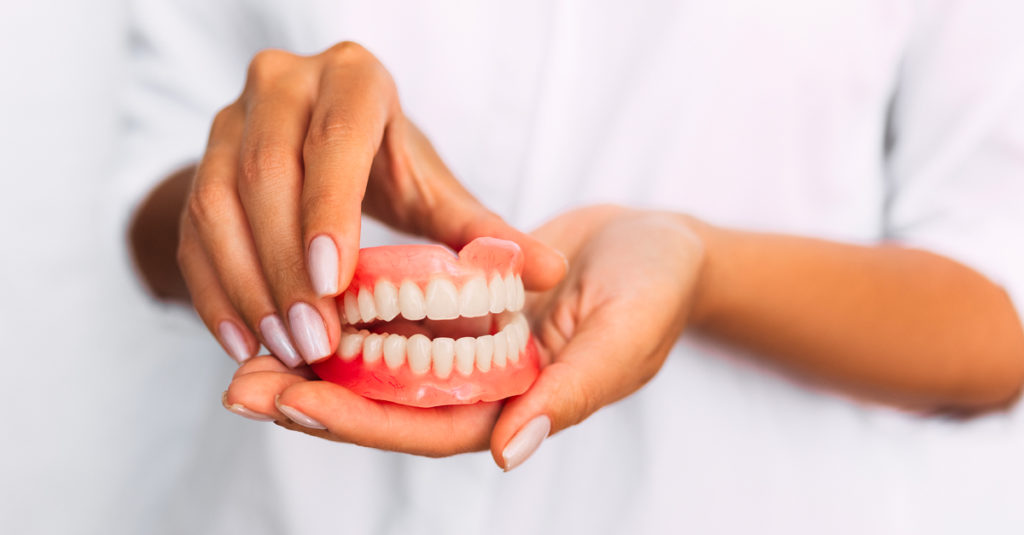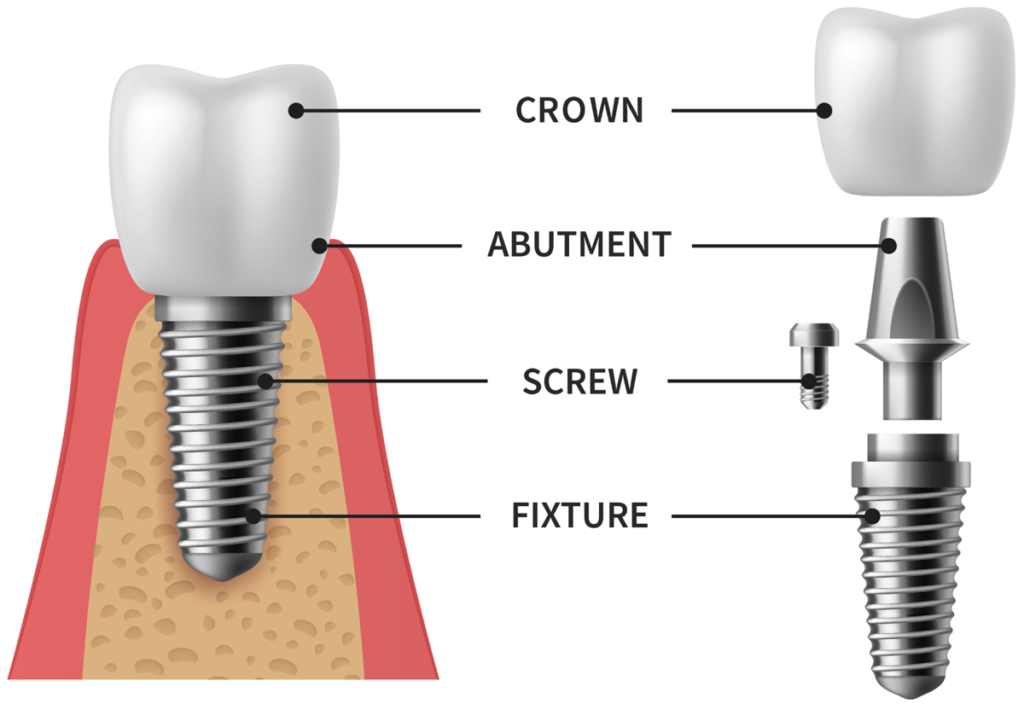
How modern dentistry can give you back the smile you miss
Have you lost a tooth, or multiple teeth, and don’t like how it looks? Perhaps you’re finding it harder to eat and drink with the extra gaps?
Thankfully, you don’t need to struggle on. There are ways you can restore your smile and get back to life with a full set of chompers.
Modern dentistry gives you options when it comes to tooth replacement. And in this article we’ll discuss two of the most common choices—dentures and dental implants.
By looking at
- how they’re made and fitted,
- how they blend into your everyday life,
- and the costs associated
you’ll be in a stronger position to weigh up the pros and cons for each. Dentures vs implants: let’s begin!
All about dentures
The Australian Dentistry Association (ADA) describes dentures as “artificial substitutes for missing natural teeth”. Usually made from acrylic or a combination of metal (cobalt chrome) and acrylic, they can be a permanent or temporary tooth replacement option for people of all ages. Full dentures are nearly always made from acrylic, whereas partial dentures are usually made using cobalt chrome because it’s more comfortable.
When fitted correctly, dentures are designed to look and work just like your natural teeth.
A defining feature of dentures is that they’re removable, and can usually be fitted to your gums regardless of how much bone is present in your jaw. Depending on how many teeth you’ve lost, you can get either a complete set or a row of two or three to replace a few missing teeth.
Whether you’ve lost your teeth through decay, gum disease or trauma, dentures are a cost-effective choice. It’s still a financial outlay, as is any tooth replacement option. But the treatment process for dentures is somewhat simpler than implants, making them a more affordable option.
How dentures are made and fitted
The first step in making dentures is taking an impression of your upper and/or lower gums. Happily, there have been incredible advances in digital dentistry that make it possible to take accurate scans quickly and easily.
Along with these impressions, your dentist will also study your bite and jaw alignment. They do this to make sure they give you the correct denture length so talking and chewing are comfortable. Only then do they make a test set of dentures and fit them to your mouth.
When that’s done they’ll check the fitting of the preliminary dentures, and adjust the alignment or length of the teeth if necessary.
Once everything is as it should be, they will make and fit your final set of dentures. You shouldn’t need any adhesive, as a well-fitting set of dentures will mould to your gums.
Are dentures right for you?
When weighing up dentures vs implants, there are a few things to consider: cost, lifestyle, any medical conditions, and jaw bone density.
Here’s why you might prefer dentures.
- The cost is more in line with your budget.
In terms of what you can afford and what you’re comfortable paying for dental restoration work. If you have private health with dental cover, your policy is more likely to include dentures. - You’re happy with dentures.
If you’ve had dentures before and found them comfortable, implants may not seem any more beneficial. - Medical conditions or medicines mean implant placement isn’t possible.
Osteoporosis, radiotherapy treatment and some IV drugs can affect the longevity of implants. - You smoke and don’t want to quit.
Smoking is a factor in periodontal diseases, which can cause implants to detach. Giving up smoking is encouraged before implant treatment. - You’ve lost some jaw bone material.
Whether through age, injury or gum disease, you may have lost the bone material needed for implants. A bone graft is possible, but if you don’t wish to undergo this surgery then dentures may be a better fit for you.
The downsides of dentures
So why wouldn’t you want dentures? Well, unlike some other tooth replacement options, dentures can take time to feel comfortable. Like a new pair of shoes, you need to ‘wear in’ new dentures. And so at first they can rub and irritate a little.
Your dentist will explain what is and isn’t normal in this instance. For example, sores and ulcers forming on your gums from wearing dentures is quite normal. But if it happens often, you need to know when to see a dentist to get help. Sores and ulcers are usually caused by the dentures rubbing due to a poor fitting. But they can also be caused by improper cleaning and hygiene practices.
Speaking of denture cleaning and hygiene, for your dentures to stay sparkling (and your mouth healthy) you need to:
- brush twice a day using a specialised denture cleanser (not toothpaste)
- remove any lingering adhesive from your gums using a soft-bristled toothbrush
- take them out every night and soak them in a cleaning solution.
Unlike dental implants, dentures need to be refitted now and then. Your bite changes over time, and your dentures will need adjusting to match.
The pros of dentures
Despite all that, dentures are the right choice for many people. Here’s what they’ve got going for them.
- Dentures tend to be quicker and easier to make and fit.
- They’re cost-effective, with the cost of dentures in Australia being (roughly) between $1,500 and $8,000.*
- They’re a good short-term solution (while you save for something longer lasting).
- They can be used even if you have a weaker jawbone.
The key to being happy with your dentures is maintaining a proper oral hygiene routine. If you’re confident you can do that, then dentures are a good and reliable choice.
*The true cost of treatment depends on any preliminary work you might need, where you’re receiving treatment, whether it’s a partial or full denture, and what materials your dentist uses to make your denture.
Okay, let’s look at dental implants.
All about implants
Dental implants come in two parts:
- the screw-like implant, which is fitted into the jawbone
- the crown cap, which delivers the look and function of a natural tooth.
Like dentures, implants can replace one tooth or multiple teeth, and have become increasingly popular in recent years.

How dental implants are made and fitted
Fitting a dental implant happens over the course of several appointments.
The first step of the journey is getting a map of your mouth. Using digital dentistry techniques, scans of your teeth and gums are taken. This state-of-the-art technology can quickly create accurate models of your mouth. No more gloopy impressions needed.
From the scans we can see whether any damaged root needs to be extracted from your jawbone, or whether any other underlying oral health problems need sorting out before your implant is fitted.
Assuming all is well, a titanium, screw-like fitting is placed into your jawbone. This is the ‘implant’ or ‘post’, and does the same job as a natural tooth’s root: anchoring the new tooth so it stays put.
Implants come in different sizes. Which one your dentist will use will depend on:
- the tooth being replaced
- the size of your mouth and jaw
- the size of the gap being filled.
The jawbone then needs to grow around the implant and secure it in place, which can take a couple of months. While that’s happening, your dentist will work on the aesthetic aspect of the tooth replacement. This involves making (and eventually placing) a natural-looking ceramic crown on top of the implant. Your final appointment will be fitting the crown so it looks and feels like your other teeth.
Are dental implants right for you?
When it comes to dentures vs implants, implants win the battle on the treatment intensity level. But dental implants are a great option for anyone who:
- is free from gum disease
- has a strong, healthy jaw
- doesn’t have any tooth decay
- is in good physical health overall.
Dental implants also last longer than dentures, and don’t need adjusting or replacing as often. This makes them a particularly good choice for younger people who want a long-term solution.
The cons of dental implants
In the dentures vs implants debate, implants look like a solid choice on paper. And for many, they are. One of the biggest benefits (which we’ll get into shortly) is when done to a high standard, implants let you get on with everyday life as if you still had a natural tooth.
But getting an implant is rarely a quick or easy treatment. You need to be committed to investing in your oral health. And yes, ‘investing’ does refer to the cost.
Dental implants can be quite a financial outlay,with the cost of a single implant in Australia ranging from $3,049 to $7,175. Of course, the actual costs of dental implants depend on:
- the number of implants you need
- any underlying oral health challenges that need solving
- any extra surgical procedures needed, such as bone grafting or tooth extraction.
Before deciding whether dental implants are right for you, you need to understand the investment. And the best way to get a price that’s relevant to your situation is to contact your dentist.
Besides the cost and treatment time, there can be other implant complications such as infection and even mechanical problems (e.g. an implant loosening, a crown cracking).
The pros of dental implants
Once you’ve made the commitment to getting a dental implant (or multiple implants,) the pros far outweigh the cons.
- It’s a longer-term solution. Implants are fitted into your jaw and made from hard-wearing titanium.
- Your implant won’t need refitting. Once it’s in it’s in, and the implant will move with the growth of your jaw.
- Implants can provide more comfort. They won’t move around (which minimises the risk of sores or ulcers), and can be relied on to work like natural teeth when chewing.
- Easier care and hygiene. Implants can be brushed and flossed in the same way as natural teeth.
Deciding which is better: dentures vs implants
Choosing the tooth replacement treatment that’s right for you comes down to knowing what your personal circumstances will allow and what will suit you best. It can also be influenced by lifestyle factors, such as the foods you like to eat, the time you can devote to good oral hygiene, and even your budget.
Researching the difference between dentures and implants is a good start. Hopefully this guide has helped. Beyond that, it’s time to talk to your dentist.
If you’re in the Yeppoon or Rockhampton area we’d love to help you know you’ve made the right choice.
Together we’ll look at your dental history, your needs, and of course the condition of your teeth and gums. And from there we’ll find the best treatment plan for you.
Let’s get started.
Contact
"*" indicates required fields